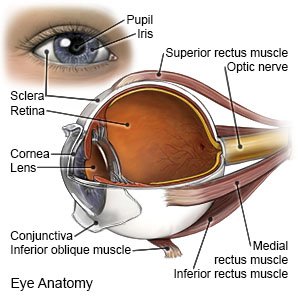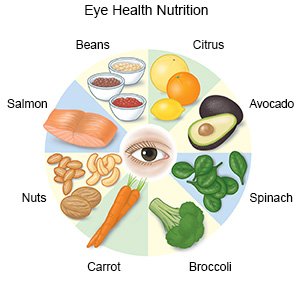Choroidal Melanoma
Medically reviewed by Drugs.com. Last updated on Aug 4, 2025.
AMBULATORY CARE:
Choroidal melanoma
is cancer found in the choroid. This is a tissue that lines the eye between the retina and the sclera. The sclera is the white part of your eye. A choroidal melanoma can become large and cause your retina to detach. This can cause vision loss. It can also spread to other parts of your body, such as your liver.
 |
Seek care immediately if:
- You have a sudden change in your vision or loss of vision.
- You have eye pain.
Call your doctor or ophthalmologist if:
- You see more floaters or flashes of light than usual.
- You have questions or concerns about your condition or care.
Treatment:
Your eye care provider may recommend watchful waiting. This means you do not receive immediate treatment, but you come in for regular exams to watch for changes. This is usually only done if the choroidal melanoma is small. If it is larger, or becomes larger during watchful waiting, your provider may recommend any of the following:
- Radiotherapy is a procedure that uses radioactive seeds to kill cancer cells. The seeds are put onto a piece of metal called a plaque. Your eye care provider sews the plaque to the outside wall of your eye. This keeps the seeds in place against your eye. Treatment lasts several days, and then the plaque is removed.
- Radiation therapy kills cancer cells with high-energy x-rays. Radiation can keep cancer cells from growing if they are not killed.
- Photocoagulation is a procedure used to prevent nutrients from getting to cancer cells. A laser is used to destroy the blood vessels that supply the cells. This causes the tumor cells to die. This procedure may also be called light coagulation.
- Thermotherapy is a procedure that uses a laser to shrink cancer cells. The laser gives off heat that destroys the cells.
- Surgery may be used to remove the tumor and some of the healthy tissue around it. This is done for smaller tumors. If your tumor is larger, a surgery called enucleation may be needed. This surgery is used to remove the eye and part of the optic nerve. It is only done if your vision cannot be saved. The surgery may be needed if the tumor is large, creates pressure in your eye, or cancer cells spread to your optic nerve.
Help keep your eyes healthy:
You may not be able to prevent choroidal melanoma, but you can help keep your eyes healthy:
- Wear sunglasses with ultraviolet (UV) light protection. UV light from the sun can damage your eyes.
- Eat foods that contain eye-healthy nutrients. Eye-healthy nutrients include vitamin A, vitamin C, vitamin E, omega-3 fatty acids, lutein, and zeaxanthin. Examples of foods that contain these nutrients include spinach, peanuts, salmon, collard greens, avocados, squash, eggs, and blueberries. Ask your healthcare provider for a full list of foods that contain eye-healthy nutrients. You may also need to take a vitamin or supplement to help you get enough of these nutrients.

- Do not smoke. Nicotine and other chemicals in cigarettes and cigars can cause eye and blood vessel damage. Ask your healthcare provider for information if you currently smoke and need help to quit. E-cigarettes or smokeless tobacco still contain nicotine. Talk to your healthcare provider before you use these products.
- Limit alcohol use. Heavy alcohol use may increase your risk for eye diseases. Ask your healthcare provider if it is okay for you to drink alcohol.
Follow up with your doctor or ophthalmologist as directed:
You will need follow-up tests and ongoing monitoring to make sure the cancer does not spread. Write down your questions so you remember to ask them during your visits.
© Copyright Merative 2025 Information is for End User's use only and may not be sold, redistributed or otherwise used for commercial purposes.
The above information is an educational aid only. It is not intended as medical advice for individual conditions or treatments. Talk to your doctor, nurse or pharmacist before following any medical regimen to see if it is safe and effective for you.
Further information
Always consult your healthcare provider to ensure the information displayed on this page applies to your personal circumstances.
